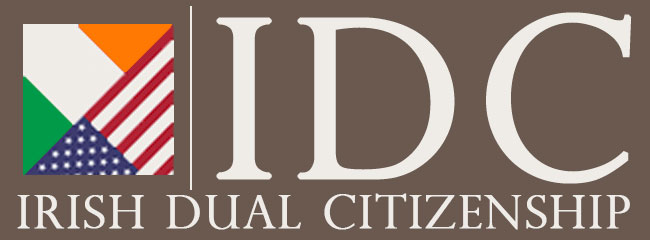FREQUENTLY ASKED QUESTIONS
ANSWERS TO THE MOST COMMON QUESTIONS WE RECEIVE ABOUT IRISH CITIZENSHIP
Can Americans hold dual citizenship?
Yes. While dual citizenship is not formally recognized in the United States, there is still no legislation against it. Also, in the event of an American taking on responsibilities relating to citizenship elsewhere, he or she will not forfeit his or her original citizenship.
Do I qualify for Irish dual citizenship?
Many people of Irish descent qualify for Irish citizenship. You may qualify for Irish citizenship if you meet some basic requirements: If you are the child of an Irish parent or one of your grandparents, or in rare cases one of your great-grandparents, was born in Ireland, you may claim Irish citizenship. Irish citizenship can be claimed by both maternal and paternal lines, regardless of where or when the applicant was born. Certain cases are unique and must be carefully preliminary assessed.
How do I apply for dual citizenship in the US?
Irish dual citizenship applications do not get filed at an Irish consulate or embassy, rather applications for Irish citizenship by descent must be submitted online by registering with the Foreign Births Registry in Ireland.
How can I get Irish citizenship?
Once you are a citizen of Ireland, you can submit a passport application online. The current turnaround time for a first-time application is about 20 business days, while a renewal will take 10 days. The current fee for an adult standard 10-year passport is €75.
What documents do I need for Irish citizenship?
You will need to send the following documents: a signed and witnessed application form, original copy of your birth certificate (that also shows your parents’ details), a copy of your current state-issued identification, two documents (original copies) that show proof of your address, four passport photographs (in color), as well as documents regarding your ancestor with Irish descent (parent or grandparent): original birth certificate (with parents’ information), original marriage certificate (if applicable), any change of name document (if applicable), a certified copy of their identification that has been issued by the State (if alive), a death certificate (if deceased).
How long does it take to get Irish dual citizenship?
Once the application and documentation is submitted, it can take about 9 months to 1 year to receive the certificate of citizenship. You can then apply for an Irish passport online or at the relevant Irish embassy or consulate if living abroad, or at the Passport Service of the Department of Foreign Affairs in Ireland.
How much does it cost to get Irish dual citizenship?
If you are making a citizenship by descent application, payment is made online when you complete the application. If you are over 18, the registration fee and certificate cost is €270. There is also a non-refundable postage and handling fee of €8. For those under the age of 18, the cost of registration and certificate is €145, plus the non-refundable postage and handling fee of €8.
How can an American get dual citizenship in Ireland?
If you can prove that you have Irish ancestry and meet the necessary requirements, you can lawfully pursue dual citizenship in Ireland. Ireland permits dual citizenship with the United States and you will not need to renounce your original citizenship during this application process.
What qualifies you for dual citizenship?
Naturalization is another process that can help you obtain dual citizenship. This process takes certain factors into account such as marriage to an Irish citizen and the number of years you have been a resident in the country.
Are you an Irish citizen if you are born in Ireland?
All persons born in Ireland before January 1, 2005 are automatically citizens by birth regardless of the nationalities of their parents. Citizenship for individuals born in the country since that date depends on the nationality or residence history of their parent or parents at the time of birth.
How long do you have to live in Ireland to become a citizen?
You may be eligible to apply for citizenship by naturalization if you have been a legal resident for at least 5 out of the last 9 years, including 1 year of continuous residence immediately before the date you apply.
Is dual citizenship allowed in Ireland?
Yes. Under the Irish law, obtaining Irish citizenship does not require you to renounce any other citizenship and will not interfere in any way with other nationalities you may hold.
Does Ireland have birthright citizenship?
Before January 1, 2005, everyone born on the island of Ireland was an Irish citizen by birth. Following an amendment to the Constitution of Ireland, citizenship by birth is no longer an automatic entitlement to everyone born on the island of Ireland. If you are born on or after January 1, 2005, your entitlement to Irish citizenship depends on the nationality or residence history of your parent or parents.
Does Ireland allow dual citizenship?
Yes. Irish law allows dual citizenship. Ireland requires you to prove your Irish ancestry and apply for citizenship online by registering with the Foreign Births Registry in Ireland. Ireland does not require you to renounce your current citizenship(s) when claiming dual citizenship.
Does Ireland allow triple citizenship?
Yes. Ireland permits multiple citizenship and you do not need to renounce your original citizenship during this process. If you can prove your Irish ancestry and blood ties to the country, you can apply to become an Irish citizen. Alternatively, the same rule applies in the case of naturalization through residency.
Can I get Irish citizenship if my child is Irish?
You may be eligible for a “permission to remain in Ireland” on the basis of being a parent of an Irish child under the age of 18, however this does not automatically entitle you to citizenship. Subsequently, upon meeting a number of requirements, you may be eligible for citizenship by naturalization based on residence after a certain number of years.
What is the easiest country to get dual citizenship?
Ireland and Italy are known to be the most lenient countries in terms of dual citizenship. If you can prove your ancestry, you can apply for citizenship in each country. However, not everybody qualifies and certain limitations exist. For example, you are only able to apply for Irish citizenship by descent if you have a parent or grandparent that was born in Ireland, not a great-grandparent, wherein there are other eligibility criteria and a different application process.
Can I live in Ireland as an American citizen?
American citizens do not need a visa to stay in Ireland for ninety days or less. However, you are not permitted to work in Ireland during this time, in which case either a business or employment visa or residency is required.
How long can a US citizen live in Ireland?
A US citizen can live in Ireland for ninety days or less without the requirement of a visa. Past ninety days, they would need to apply for the appropriate long stay visa that fits their situation, such as studying or employment.
What is the cost of living in Ireland?
Cost of living varies city to city and can differ based on your personal preferences and lifestyle. Overall, Ireland has a higher cost of living versus some other European countries, with Dublin often compared to London as having a similar cost of living.
How can I get permanent residence in Ireland?
If you have lived in Ireland for more than five continuous years and meet other specific criteria, you can apply for permanent residency.
How do I establish residency in Ireland?
Once granted a permission to stay in Ireland, illustrated by a stamp number which informs what you can do and how long you can stay in Ireland, upon arriving in Ireland you must register your presence within 90 days. This is how you get an Irish Residence Permit (IRP). If you live in Dublin, you must make an appointment to go to the Immigration Service Delivery (ISD) registration office, otherwise, you must go to your local immigration registration office where you live.
Is Ireland expensive to live?
For many people, Ireland can seem like a rather expensive place to live. However, everything is relative and as a rule, the cost of living is much higher in the city than in rural areas. More specifically, this cost of living will depend on your lifestyle and whether you choose to live in a frugal manner or not.
Can a US citizen work in Ireland?
American citizens require an employment visa (work permit) before arriving in Ireland to work.
What is a good salary in Ireland?
Salary can vary in Ireland just as much as anywhere else in Europe. Experience and qualifications will have a lot to do with this amount but the location and benefits involved will also be a factor. Recent statistics show the average disposable salary for an Irish resident is €1,800 which is enough to live comfortably in most cities and towns.
Can Americans buy property in Ireland?
Yes. Americans can purchase property in Ireland with or without Irish residency or citizenship.
Can a US citizen retire in Ireland?
US citizens do not need a visa to enter Ireland and can stay for ninety days or less. However, US citizens who retire to Ireland or plan on living there without working should pursue alternative long stay visa options.
Does Ireland use the euro?
Yes. Ireland is one of twenty countries in Europe that use the Euro as currency.
Does Ireland require a visa?
US citizens can travel to Ireland visa-free for tourism and business stays of ninety days or less. You must have a passport that is valid for the duration of your stay.


